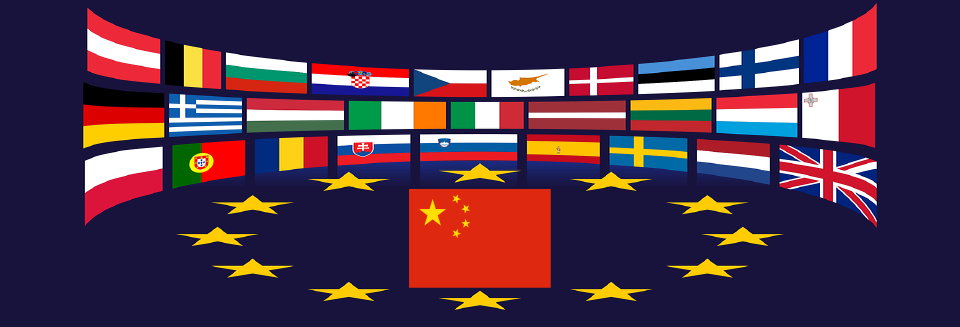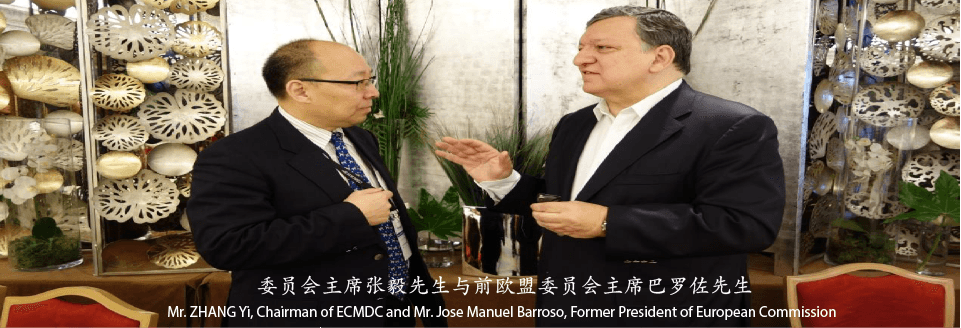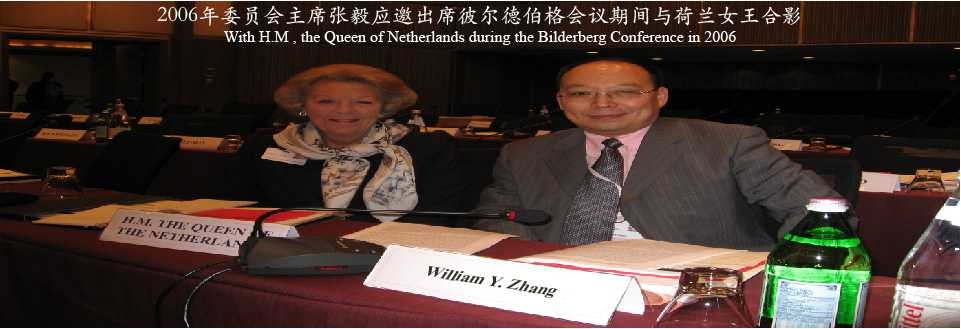Letter of Agreement between ECMDC and UNESCO
2016-11-10
On November 10th, 2016, Chairman ZHANG Yi, Deputy Secretary-General HU Zhenming, and Mr. Hermann Josef Walschebauer, Managing Director of European Consortium of Technology Transfer (ECTT), Mr. Henrich Guntermann, CEO of ECTT visited at the occasion of the World Science Day on 10 November the Headquarters of UNESCO in Paris, France.
Mr. ZHANG Yi and Mr. Romain Murenzi, Director of Division of Science Policy and Capacity Building and Executive Secretary of the International Basic Science Programme of UNESCO respectively represented ECMDC and UNESCO to sign a Letter of Agreement.
United Nations Educational, Scientific and Cultural Organization (UNESCO) was founded on November 16th, 1945 with the Headquarters in Paris, France. Its declared purpose is to contribute to peace and security by promoting international collaboration through educational, scientific, and cultural reforms in order to increase universal respect for justice, the rule of law, and human rights along with fundamental freedom proclaimed in the United Nations Charter. “Building peace in the minds of men and women” is the overall objective of UNESCO. UNESCO has 195 member states and 9 associate members up to date, and its incumbent Director-General is Ms. Irina Bokova from Bulgaria.
The delegation headed by Mr. ZHANG Yi met with Mr. Jean-Paul Ngome Abiaga, Division of Science Policy and Capacity Building (SC/PCB) Deputy Executive Secretary of International Basic Sciences Programme (IBSP), Ms. Magalie Lebreton-Traore, Programme Specialist, Secretariat of the International Basic Sciences Programme, Ms. GU Xiang, Project Assistant of Natural Sciences Sector of UNESCO, and discussed the fruitful collaboration on the Microscience programme.
(The Standard Version Approved by UNESCO)
On November 10th, 2016, Chairman ZHANG Yi, Deputy Secretary-General HU Zhenming, and Mr. Hermann Josef Walschebauer, Managing Director of European Consortium of Technology Transfer (ECTT), Mr. Henrich Guntermann, CEO of ECTT visited the Headquarters of UNESCO in Paris, France. Mr. ZHANG Yi and Mr. Romain Murenzi, Director of Division of Science Policy and Capacity Building and Executive Secretary of International Basic Science Programme of UNESCO respectively represented ECMDC and UNESCO to sign the Letter of Agreement in order to jointly set up UNESCO-China Sci-Tech Innovation and Education Center.
United Nations Educational, Scientific and Cultural Organization (UNESCO) was founded on November 16th, 1945 with the Headquarters in Paris, France. Its declared purpose is to contribute to peace and security by promoting international collaboration through educational, scientific, and cultural reforms in order to increase universal respect for justice, the rule of law, and human rights along with fundamental freedom proclaimed in the United Nations Charter. “Building peace in the minds of men and women” is the symbolic slogan of UNESCO. UNESCO has 195 member states and 9 associate members up to date, and its incumbent Director-General is Ms. Irina Bokova, Bulgarian politician.
The delegation headed by Mr. ZHANG Yi met with Mr. Jean-Paul Ngome Abiaga, Division of Science Policy and Capacity Building (SC/PCB) Deputy Executive Secretary of International Basic Sciences Programme (IBSP), Ms. Magalie Lebreton, Programme Specialist, Secretariat of the International Basic Sciences Programme, Ms. GU Xiang, Project Assistant of Natural Sciences Sector of UNESCO.
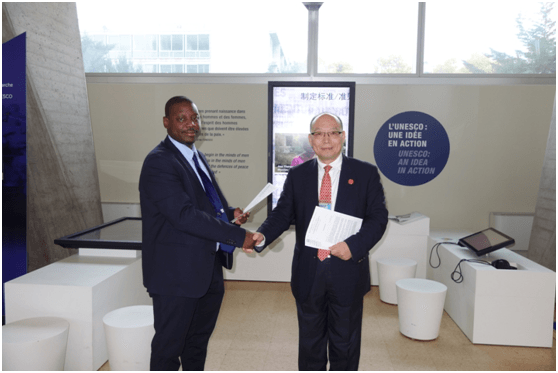
Mr. ZHANG Yi and Mr. Jean-Paul Ngome Abiaga
Mr. Ngome Abiaga firstly expressed his welcome to the delegation; then he introduced the current situation of Natural Sciences Sector and Microscience Programme, which would be the initial project of the joint efforts of building UNESCO-China Sci-Tech Innovation and Education Center along with ECMDC. He said, Natural Sciences Sector looked forward to exploring the innovative partnership with ECMDC, and jointly promoted the existing programmes of UNESCO including Microscience Programme in China in a faster and better way, from which China would benefit. He further explained that Microscience Programme was the social welfare project, which aimed to use the simple kits to carry out the natural scientific experiments of physics, chemistry and biology with a view to cultivating the curiosity for the natural discovery and knowledge in the hearts of students of developing countries. Microscience Programme had been in operation for nearly two decades and established good social reputation. Henceforth, Natural Sciences Sector was quite willing to work with ECMDC and jointly developed the series of Microscience Programme which would fit the actual demands of Chinese students on the basis of the current achievements.
Mr. ZHANG Yi extended his gratitude to the warm reception of Mr. Ngome Abiaga, and reported the preparatory work concerning UENSCO-China Sci-Tech Innovation and Education Center. He said, after the thorough evaluation of Microscience Programme, ECMDC held the several plenary meetings and reached the consensus of promoting the Programme along with Natural Sciences Sector. In the meanwhile, ECMDC intended to introduce more high-quality projects of UNESCO into China, and strengthen the international cooperation capacity of China in the fields of sci-tech innovation and education in an overall way. Therefore, ECMDC motivated to set up UNESCO-China Sci-Tech Innovation and Education Center along with UNESCO. Mr. ZHANG Yi remarked, he was very delighted to see that the proposal submitted by ECMDC had received the positive feedback from Natural Sciences Sector; the Letter of Agreement, which had been signed today meant that the original idea had become the forward bugle call.
Mr. Ngome Abiaga said, China was the important member state of the big family of UNESCO. China had made the remarkable achievements in the field of sci-tech innovation, while the success of sci-tech innovation was dependent on the international education cooperation and exchange. Since UNESCO had been dedicated to the international cooperation in educational, scientific and cultural sectors for 70 years, he firmly believed that the experiences accumulated by UNESCO would surely be helpful for Chinese students and researchers, who would be quite willing to further participate in the international collaboration, improve their own capacity, and make their own contributions to the peace of the world. Mr. Ngome Abiaga remarked, UNESCO-China Sci-Tech Innovation and Education Center, the joint efforts between two parties would be the cooperation with positive significance.
Mr. HU Zhenming made the detailed presentation concerning the progress of the preparatory work of UNESCO-China Sci-Tech Innovation and Education Center. He said, ECMDC held several rounds of negotiations with the local governments, the educational authorities, the sci-tech authorities, higher institutions in China. All the concerned Chinese parties appreciated the mission and functions of the future Center. They reached the universal consensus that it would be very meaningful and promising to introduce the existing projects of UNESCO in sci-tech and educational sectors into China in a systematic way, to provide the new channel and cooperation platform for the sci-tech innovation in China, and to create chances for Chinese education to participate in the international cooperation. In the meantime, the Chinese partners indicated their willingness of working with ECMDC and UNESCO to promote the newly developed projects on the basis of successful experiences in sci-tech and educational sectors, which had been accumulated since China’s reform and opening-up. These projects would be popularized in other countries and regions, and provide the new platform for the people-to-people communication along with Chinese “One Belt One Road” Initiative.
Mr. Ngome Abiaga admired the high efficiency of ECMDC. He said, he would pay close attention to the promotion work of the Center, and provide the overall support to the construction of the Center along with other colleagues of educational, cultural sectors in order to enable the Center to become the link or bridge concerning the project cooperation and docking between UNESCO and China.
Mr. ZHANG Yi expressed his thanks to the words of Mr. Ngome Abiaga. He said, ECMDC intended to turn the Center to be the demonstration model of the innovative cooperation between China and UN system. The Center aimed to actualize its own sustainable development and become the converging place for Chinese social resources that were devoted to the affairs of sci-tech innovation and education. ECMDC had reached the consensus of cooperation with many local governments of China and would jointly set up branches of UNESCO-China Sci-Tech Innovation and Education Center in Chinese cities. The action plan of the Center would be implemented step by step by ECMDC as well. In the meanwhile, China-EU Municipal Development Forum, the ongoing project of ECMDC would provide the cooperation platform for Natural Sciences Sector and other sectors of UNESCO to find more Chinese potential partners. Mr. ZHANG Yi invited Mr. Ngome Abiaga and Ms. Magalie Lebreton to attend the inaugural ceremony of UNESCO-China Sci-Tech Innovation and Education Center and China-EU Municipal Development Forum, who gladly received the invitation.
ECTT, the partner of ECMDC would participate in the construction of UNESCO-China Sci-Tech Innovation and Education Center. Mr. Hermann Josef Walschebauer, Managing Director of ECTT, Mr. Henrich Guntermann, CEO of ECTT respectively introduced ECTT and the successful cooperation cases between ECTT and ECMDC. Mr. Guntermann remarked, owing to the arrangement of ECMDC, he paid several visits to China and witnessed with his own eyes the great potential of China in the fields of sci-tech innovation and education, and the boundless cooperation opportunities. Against the background that Sino-European relations became more and more important, it would be very meaningful to strengthen the mutual trust and friendship between European and Chinese people through sci-tech innovation and education projects. Therefore, ECTT would spare no efforts to integrate high-quality European sci-tech innovation and education resources into the work of building UNESCO-China Sci-Tech Innovation and Education Center. Mr. Ngome Abiaga said, he would love to see that the Center would have partners from Europe and other regions, and gradually become the platform that was rooted in China with the exposure to the world.
After the meeting, Mr. ZHANG Yi and Mr. Ngome Abiaga attended the ceremony of transferring the Letter of Agreement to the counterpart at the exhibition hall on the ground floor of UNESO Headquarters. The building of UNESCO-China Sci-Tech Innovation and Education Center commences.

Mr. ZHANG Yi, Mr. HU Zhenming and Mr. Ngome Abiaga, Mr. Hermann Josef Walschebauer (Left One) , Mr. Henrich Guntermann (Right One)
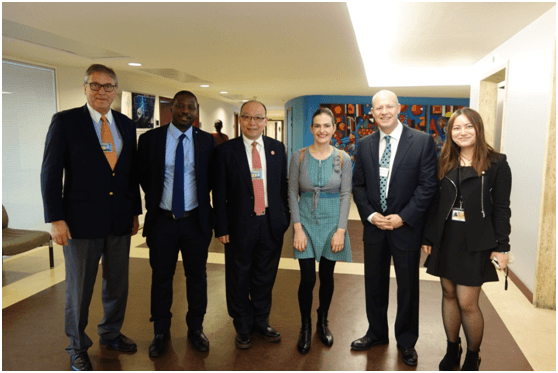
Mr. ZHANG Yi and Ms. Magalie Lebreton (Left Three), Ms. GU Xiang (Right One)
Appendix: The Mission of UNESCO-China Sci-Tech Innovation and Education Center
To promote, and execute various UNESCO public welfare projects concerning sci-tech innovation and popular science education in China;
To develop various sci-tech innovation and popular science education, vocational training projects that meet the actual demands of China;
To create the cooperation platform for Chinese and foreign youths innovation and entrepreneurship;
To establish the cooperation mechanism of international sci-tech innovation and technology development between China and foreign countries;
To develop a series of top-notch popular science education and innovation courses and projects along with the educational institutions and concerned authorities in China;
To further the branding work and social recognition of UNESCO in China.
(The Expanded Version by ECMDC)


